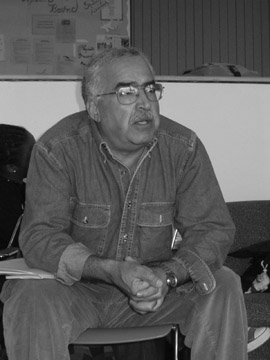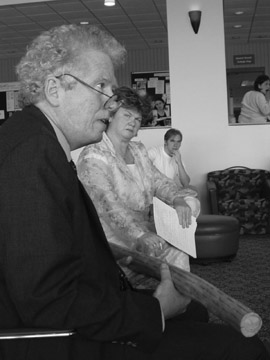“Two years ago today, the world began to share a story.”
Maggie Cahill, interfaith Catholic chaplain of the UMass Boston campus ministry, opened the roundtable discussion “Post-9/11” with this simple line. The purpose of the roundtable discussion, held in the Ryan Lounge, was to allow members of the UMB community a chance to express their thoughts and feelings on the subject in an environment that was supportive and non-judgmental.
Cahill introduced the attendees to a talking stick, an instrument used by various Native American tribes in council. The idea is that one person holds the talking stick while he/she is speaking and does not relinquish it until he/she is finished. The listeners do not interrupt the speaker or interject comments. Cahill stressed that she wanted honest remarks from the speakers. “And not from the mind,” she added, “but from the heart.”
Although there were few students in attendance, there was a good mixture of faculty and staff present. Paul Atwood, a professor of American Studies and a Vietnam War veteran, jumpstarted the discussion by commenting on a report that he saw on NBC television regarding the mysterious “9/11 syndrome.” Since the events that saw the destruction of the WTC, over 30,000 New Yorkers, many of them public service workers, have come down with respiratory problems. Atwood spoke about how the White House squashed an Environmental Protection Agency report that warned of the dangerous air quality in lower Manhattan.
Atwood said he sees many parallels between the War on Terror and the Vietnam conflict. The administration of the time of the Vietnam Conflict, he said, also promised a deployment of short duration, however American troops were stationed in Southeast Asia for nearly a decade. Already promises of a short overseas commitment are being broken by the Bush administration. “I wish I could be optimistic, but I cannot.”
Alan Hirsch, a Spanish major, reminded the audience that September 11 was the anniversary of another infamous event. In 1973, a military coup sponsored by the United States occurred in Chile. President Salvador Allende, a progressive leader in a region of corrupt governments, was executed. Thus began the era of Agosto Pinochet, a ruthless dictator that terrorized the nation of Chile for years to come. Henry Kissinger, then Secretary of State under President Richard Nixon, was the prime organizer of the coup.
Other students spoke about the struggle toward peace. Many stated that the events of 9/11 caused them to ponder issues and situations other than terrorism. Anthropology professor Esther Shapiro, recently returned from a trip to Bolivia, talked about the on-going persecution that she witnessed of Latin American feminists. She also spoke about the plight of the poor, both here and abroad.
“The gap between the rich and the poor in Massachusetts has grown. We are complicit with the situation. What are we going to do about it?”
The talking stick then passed to Hordoz Shahdali, professor of Political Science. Shahdali spoke about the “phenomenon” of terrorism.
“It is a side of war. Violence feeds it.”
He then spoke about how many Arabs/Muslims are under severe scrutiny in the United States for no good reason. He told the story of how a bank employee called the Federal Bureau of Investigation to come and investigate the account of a client whose surname is Arabic. No other grounds for suspicion were given.
Kevin Bowen, director of the William Joiner Center, touched on the mass media’s role in shaping the collective opinion of many Americans. While others around the nation praised the decision by the military to embed journalists with infantry units and army divisions, Bowen called the move “disturbing.” He also warned that a soon-to-be-released movie about 9/11 will affect the American mindset in a harmful way.
The highly charged topic of 9/11 often creates an atmosphere of heightened tension. The forum was not exempt. One member of the roundtable discussion expressed her exasperation over the word terrorist. “I’m just tired of the word terrorist.” Another participant of the forum seemingly took offense at the statement and called on the speaker to clarify her statement. Soon the forum became an argument colored by angry tones. After a couple minutes, Cahill managed to restore a civil order to the discussion.
One collective sentiment of those present was the wish to expand the idea of community so that it reaches beyond the borders of the United States. Many speakers expressed a desire to participate with other nations and peoples on a political, economic, and cultural stage within an international context.
The roundtable discussion ended with the suggestion that more forums with specific topics be held. Cahill felt this forum was successful in its objective. “We accomplished what we wanted to do. It allowed us the opportunity to come together. The circle brings the ambiguous out into the open.”






















































